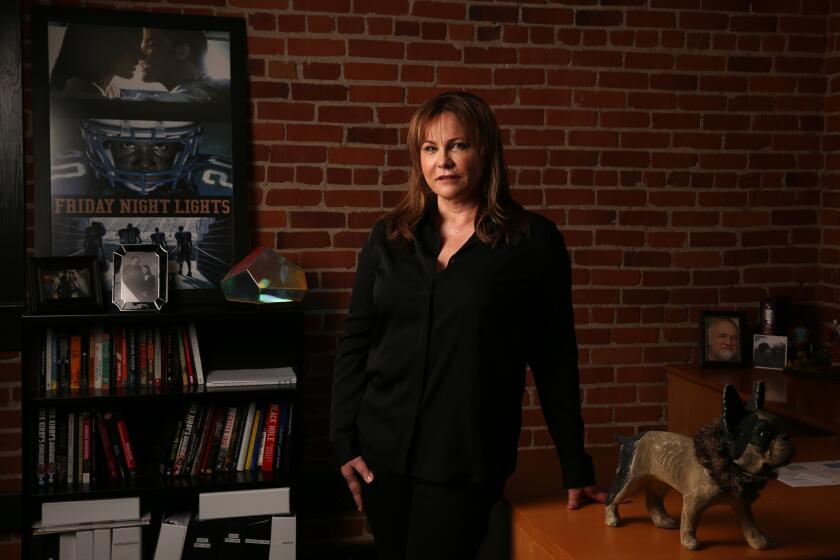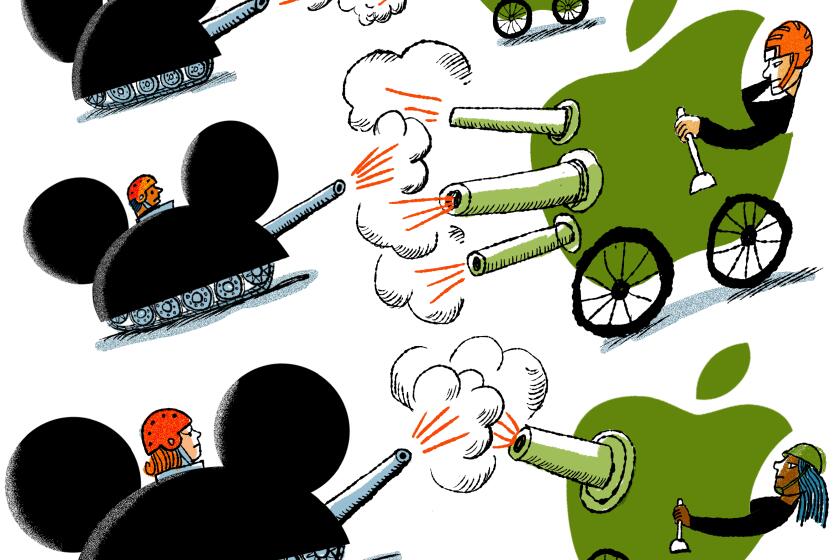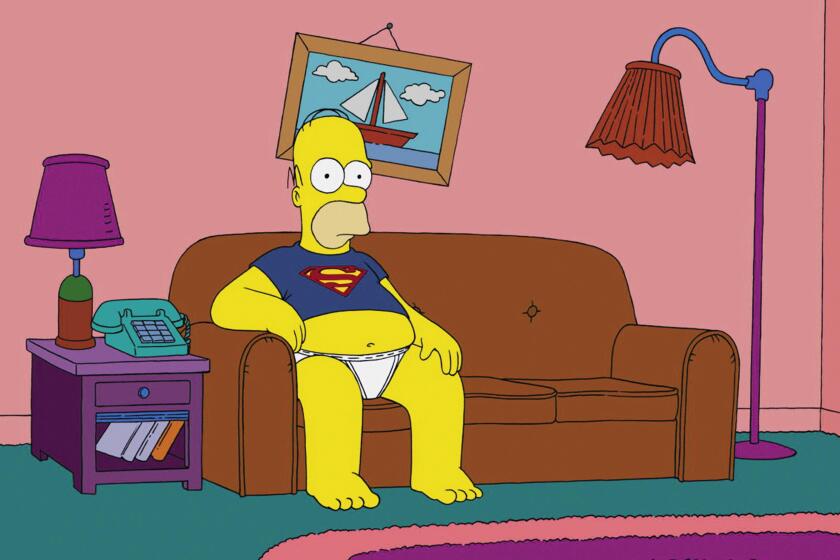How Apple plans to win the streaming wars without ‘Friends’ or ‘Game of Thrones’
- Share via
Roughly two years ago, Jamie Erlicht and Zack Van Amburg stood in front of a blank wall at Apple’s content division in Culver City and began mapping out, with taped notecards, the tech giant’s plan to take on Hollywood.
The former Sony Pictures Television presidents, freshly installed as heads of worldwide video programming for Apple, started brainstorming with an assembly of employees. Hit shows and movies of the moment — including, yes, “Game of Thrones” — were part of the patchwork. Then came guiding principles, words like “humanity” and “simplicity.”
Two years later, seated in Erlicht’s office amid the frenzy leading up to the launch of Apple’s subscription streaming service, Apple TV+, the pair elaborated on those values.
“Simple ideas that allowed you to go deeper and express yourself more,” Van Amburg said. “[It’s] sort of at the core of a lot of what [Apple] products do. They feel simple, but they allow you to do incredibly complex things.”
“We had a very diverse representation of shows on the wall, and it wasn’t about what [were] our favorite shows,” Erlicht said. “It became a psychological examination of, ‘Why is that your favorite show? What are the various levels that you enjoy watching for?’ Because we got obscure shows that very few people had ever seen, but to the individual, they spoke on a deeper level — and that’s what we really started honing in on. Like, ‘OK, we need to find the subtext. We need to find the deeper levels. We need to find the additional meaning in our shows because that’s what resonates with people.’”
What Apple defines as that “deeper level” — and whether it translates for viewers already inundated with content from a proliferating number of platforms — will determine whether the Silicon Valley mammoth, whose gadgets draw lines that snake around its stores, can become a major force in entertainment too. The first crop of projects (nine in total) that executives felt aligned with this set of guiding principles makes its debut Friday with Apple TV+ — several years after Netflix, Amazon and Hulu established themselves as key players in TV, not to mention regular Emmy contenders. The ad-free subscription service will be available in more than 100 countries.
“A surprising amount of time was spent on the defensive. What we realized is that we work in an industry that sometimes leads with a certain amount of distrust for [the] new.”
— Zack Van Amburg, Apple TV+
There’s a lot riding on the strength of Apple’s initial slate, which must lure subscribers to the $4.99 a month service. Unlike the Big Three streaming veterans, or new entrants like HBO Max and Disney+, Apple’s service doesn’t include a a deep bench of popular library titles such as “Friends,” “The Golden Girls” or even “Lizzie McGuire” to help buoy its limited offerings at launch.
“We’re focusing only on high-quality, original content,” Erlicht said. “We’re not focusing on library. We’re not focusing on any other agenda. We think that’s where the real opportunity is. We think the other networks, especially at this volume, [have] more of a spread-out focus, and therefore we can event-ize better than anyone.”
Showrunner Kerry Ehrin took the helm of Apple’s “The Morning Show” after it was underway — and decided to make #MeToo central to the story.
In addition to children’s and family programming (and, of course, Oprah), the company’s first batch of premieres features a number of adult-oriented series aimed at making it a player in the prestige TV arena — one familiar to Erlicht and Van Amburg, who previously worked together at Sony TV, where they shepherded shows like AMC’s “Breaking Bad” and “Better Call Saul” and Netflix’s “The Crown.” The slate will expand moderately over the next year, with programming from M. Night Shyamalan, J.J. Abrams and Damien Chazelle.
“We wanted to be leaders and we wanted to be innovative and show up differently,” Van Amburg said. “I think that’s why our shows feel unique. I hope they don’t feel like we’re following in the footsteps of something else.”
Whether prospective Apple TV+ subscribers will agree remains to be seen. But the reaction of the critics, which plays a vital role in shaping the profile of prestige series, has been tepid so far. “The Morning Show” has garnered decidedly mixed reviews despite its timely subject matter — allegations of sexual misconduct that upend a morning news show — and high-profile cast, which features Jennifer Aniston, Reese Witherspoon and Steve Carell. Other Apple series available at launch came in for similar treatment. Some critics were confounded by the tone of “Dickinson,” a historical coming-of-age comedy starring Hailee Steinfeld as poet Emily Dickinson; “See,” an epic sci-fi drama led by Jason Momoa set in a world where humans have lost their sight, has faced criticism of its strange plot choices.
Leading the charge to build Apple into a formidable player in Hollywood is a climb Erlicht and Van Amburg recognize has only just begun: “We had to scale something from nothing,” Van Amburg said.
The pair said they didn’t think of the Apple TV+ viewer in any ideal terms or target demographics — instead viewing their core audience as anyone ages 2 and up.
“We don’t think of it in terms of a singular demo,” Van Amburg said. “We think of it in terms of: How do we make sure that there’s something consistently showing up for you, whoever you are, however you define your taste? That has been the greatest opportunity and the greatest challenge.”
And while they had access to internal data about what types of TV and film programming people rent or buy from iTunes, the executives claimed it didn’t inform how they identified the types of projects they should pursue.
“We’re genuinely committed to our privacy policy,” Van Amburg said. “And because of that, we don’t profile individuals and customers. And I think that has actually been the most exciting part of this, which is, ‘Let’s go with our gut, let’s go with emotion. ... You certainly hear at other places, other platforms, about algorithms and analytics. We don’t lead with that ... that really isn’t the core of what we’re doing.”
Disney takes on Netflix, as HBO Max, Peacock, Apple TV+ and Quibi prepare to enter the streaming fray. Not all will be able to thrive in the increasingly crowded market, analysts warn.
When Erlicht and Van Amburg first put out the word that Apple would begin producing original shows, the pair acknowledged that the company’s profile didn’t necessarily stand on its own.
“I personally was surprised by the number of questions and the amount of concern about something new,” Van Amburg said. “Everybody had an affinity for Apple and knew the excellence that had come before, but that didn’t necessarily translate for everyone as it relates to a new business. ... That actually took some doing.”
“It took some credibility from having worked with a lot of people for years and done some [shows] that audiences enjoyed,” he continued. “It took a lot of personal promise that we were going to show up. ... Certainly, in the early days, we weren’t sharing a release date and exactly what our distribution strategy was, or even the name of the service. A surprising amount of time was spent on the defensive. What we realized is that we work in an industry that sometimes leads with a certain amount of distrust for [the] new.”
But many creators came on board, intrigued by the notion of making entertainment for the the world’s richest tech company.
“What I liked about the meeting with Apple is that they were just starting out,” “See” creator Steven Knight told The Times by telephone. “I always like to be there, or thereabouts, when something new happens.”
As streamers like Netflix, Disney+ and Apple TV+ experiment with weekly release strategies, the binge model is not as dominant as it once was.
Hollywood companies are spending millions of dollars to woo top-tier talent to create distinctive programming, and Apple is expected to spend $1 billion to $2 billion a year on its original content efforts. Attracting A-list creators also means offering a surplus of artistic freedom, Apple’s approach to which has come under close scrutiny. Earlier this year, The Times reported on concerns about executive micromanagement and overemphasis on star power in Apple TV+ shows. Earlier this summer, there were also reports that Apple told creators to avoid portraying China in a negative light.
“Yes, we give notes. Yes, we are creatively engaged,” Van Amburg said when asked about reports of interference in the creative process. “[The notes] are hopefully helpful and thoughtful. I can’t think of an instance where we didn’t ultimately side with the visionary who had to be the one responsible for being excited about telling a story. Audiences can feel when it’s someone’s true voice and they can feel, again, that purity of intent. If that’s not there — if it feels like a brand is dictating to what something creative should be, and what it should look like — that’s not the definition of true creative partnership. And this place stands for authenticity and artistic integrity. We are involved in the creative process, but never to the point that you’re changing that vision.”
“We’re focusing only on high quality, original content. We’re not focusing on library. We’re not focusing on any other agenda. We think that’s where the real opportunity is.”
— Jamie Erlicht, Apple TV+
“Dickinson” creator Alena Smith acknowledged that there were points of disagreement, but said ultimately she felt satisfied by the process.
“I’m not going to pretend it didn’t take incredible strength to for me to get through this process, and fight on behalf of my work,” Smith said by phone. “But I also feel I had champions inside Apple. I’m just as interested as everybody in this whole kind of evolving new landscape, and I think I knew what contribution I wanted ‘Dickinson’ to make, and I was fighting along with my team for that. And so we’ll see. As you know, Apple has been very secretive in general about all this. I haven’t seen any of the other shows. But I feel, without any reservation, I made the show that I wanted to make.”
Kerry Ehrin, who replaced the original “The Morning Show” showrunner, said there was no proverbial Apple school to attend: “They weren’t saying like, ‘Here’s what you can say, and here’s our brand.’”
It’s an open question whether a clear programming “brand” is even achievable in an age of TV when viewers are toggling among devices, channels, and subscriptions. But analysts are bullish on the service’s potential in the streaming market. Wedbush Securities analyst Daniel Ives predicts the service will have more than 100 million subscribers within its first three years, while Morgan Stanley analyst Katy Huberty predicted in a recent note that the service will have more than 130 million subscribers by 2025. (Consumers who purchase a new iPhone, iPad, iPod touch, Apple TV, or Mac receive a one-year free trial of Apple TV+.)
For their part, Erlicht and Van Amburg are conservative about setting expectations — at least in the near term.
“What happens Nov. 1, in terms of the success of what we’re building, is such a small, small, small factor,” Erlicht said. “The reality is, there’s no information that’s going to come [Friday] that’s going to be an indicator of the wild success of this service that’s going to happen over time.”
More to Read
The complete guide to home viewing
Get Screen Gab for everything about the TV shows and streaming movies everyone’s talking about.
You may occasionally receive promotional content from the Los Angeles Times.










